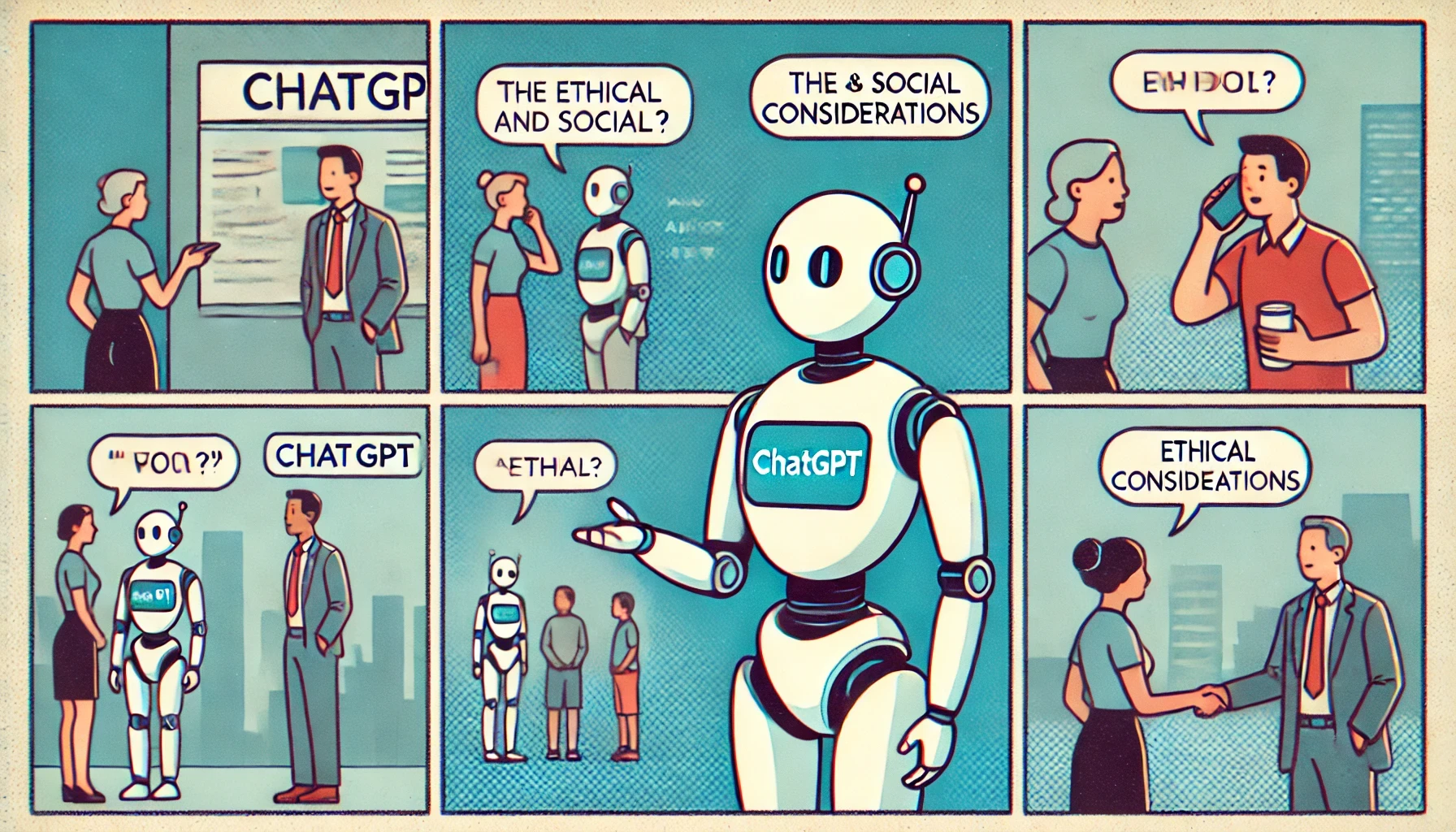Artificial Intelligence
Published
Jul 25, 2024
15
-
min read
Ethical and Social Consideration of ChatGPT
Artificial Intelligence (AI) is one of the most stunning technological developments of the last decade. The shining star of the AI sector is the ChatGPT from OpenAI. ChatGPT is a functional AI chatbot with natural language processing, complex algorithms, and the ability to conduct sophisticated conservations. The usage of ChatGPT is widely spread all over society and it also occupies a critical part of our lifetime. This generates questions about the deployment of ChatGPT from the ethical and social perspective. This paper proceeds to analyze OpenAI’s ChatGPT through critical ethical concerns of deployment and social biases composed by ChatGPT. This analysis is conducted through the theories of technological determinism and social constructionism to see how these frameworks help us to understand the AI impact on the society. These theories are explained and connected to concepts of main objectives separately. The main objectives of this paper are to analyze the ethical deployment of ChatGPT with issues of privacy-accountability, and discriminative social biases in ChatGPT. Implementation of inspection authorities and regulatory laws for AI models is discussed as the main solution for these main objectives.
Technological Determinism and Social Constructionism
Technological determinism is a theory that indicates technological development is the main objective that shapes social norms and ethics. In the context of ChatGPT, the capability of AI shapes ethical decision-making processes and the social structure. For example, AI can be used to reinforce power structures because companies that control the AI sector can dictate the usage of AI models with technological determinism.
While technological determinism highlights how technology shapes society, social constructionism is a theory that indicates social values and norms are guiding technological development. In the context of ChatGPT, social constructionism specifies social prejudices take part in AI models. For instance, if the training data of an AI model is a representation of a particular segment of a demographic group, the AI model might reflect biases against that certain group of society. This theory is significant to understand the importance of the ethical deployment of AI because possible discrimination might occur with data collection of biased data.

Ethical Deployment
Understanding these theories paves the way for analyzing ChatGPT's ethical deployment, with special attention to privacy and accountability. Ethical deployment of ChatGPT raises important concerns about user’s privacy and accountability of responses. AI models are constructed in a structure that gives the most useful output with the most precise and huge data sets. Data sets can be considered as the main dish of AI models which creates questions about the collection and usage of data. Hasselbalch (2022) emphasizes that there is a need for research on the ethical governance of AI models to ensure that AI models do not violate the privacy and transparency of users. There should be strict guidelines to prevent the usage of personal data to improve ChatGPT’s data sets. Hasselbalch (2022) indicates that there should be constant monitoring of AI models and data governance policies to prevent possible privacy infringement of AI models. Implementation of privacy policies on AI models is classified as an approach of social constructionism. Ethical concerns of society force the AI sector to accept regulatory policies and intervene in the development of AI models.
According to Cerullo’s (2024) news, ChatGPT-4o’s generated voice is impersonating Scarlett Johansson without her consent. This news indicates that there is a privacy infringements and ethical concerns, indicating the possibility of AI improperly employing personal data and likenesses to provide unauthorized representations. This situation justifies that without regulation on AI, there might be severe consequences related to various parts of the society.
Accountability is another aspect that should be regulated for the ethical deployment of ChatGPT. OpenAI embedded algorithms and specified responses to prevent unethical responses of ChatGPT, however, users find ways of bypassing these structures and compelling ChatGPT to generate unethical content. These contents are mainly consisting of unethical responses for minority groups of the society. This situation also creates a need for constant surveillance and the development of structures to prevent unethical responses.
There should be regulatory authorities that provide constant surveillance and universal ethical laws for AI models. These authorities should ensure the deploying of models is constructed ethically and privacy infringements are not conducted. This regulation should outline a prescribed framework for the development of AI technologies along with social determinism. Specialized authorities should enforce the surveillance of AI systems and implement the given regulations. Unethical responses for specific minorities and privacy infringement of users’ data can be prevented with these regulations.
Social Biases and Discrimination
Except the unethical responses about minorities, there is direct racial and gender biases in ChatGPT which can construct discrimination and social inequalities in society. Durr (2023) indicates that the existence of socially discriminatory biases in AI models can increase the existing social inequalities and shape society’s social norms in an unethical way. This situation also confirms the technological determinism that the development of AI changes societal structure. Social biases and discrimination arise because of a biased training set of AI models. For instance, racial discrimination has been found in sentencing algorithms of AI models in the criminal justice system. According to Angwin et al. (2016) investigation, black defendants had received higher risk scores compared to whites more frequently which resulted in black defendants getting higher sentences. Similar examples of systemic biases of AI indicate that AI models can create undesired and unethical outcomes for marginalized communities.
Consequences and Solutions
Biases on the data set and mechanism of ChatGPT can affect marginalized communities which also serves as a consolidation of discrimination. ChatGPT would be a source of deepening social inequalities. According to Durr (2023), there are documented critical examples of the AI model's representation of discriminatory biases. Durr (2023) specifies that Amazon unplugged AI recruitment processes because the AI model discriminated against female applicants and AI models in healthcare systems recommended giving less medical treatment to black patients. These examples underline the urgent need for diverse and inclusive training data to prevent AI models from perpetuating harmful biases. There is an increasing need for monitoring the biases in real-time and having regular updates in order to remove the emerging ones from the use of AI methodologies to ensure ethical deployment. Zhang et al. (2023) show a significant guidance for responsible AI development with ethical frameworks and policies proposed with a social constructionist view. The guideline for ethical deployment of ChatGPT and regulatory laws for discriminative concepts in ChatGPT should be designed in strict ways with constant tracing. Approach of social constructionism should be applied to prevent possible demolition from AI models on social norms by embedding unethical informations to individuals.
Social structure and the development of AI technologies shape each other with a focus on technological determinism and social constructionism. The deployment of AI technologies into society raises critical ethical concerns and possible social biases. The ethical concerns of deployment involve all members of the society with privacy issues. Accountability issues also influence minorities with discriminative responses. Social biases and discriminative data sets impact the other by deepening social inequalities and damaging the social structure of the society. Minorities and discriminated groups should be taken into account to prevent discriminative behaviors of ChatGPT. This is crucial to prevent the reinforcement of inequalities in society and to unleash the power of AI for social good.
Bibliography / References
Angwin, J., Larson, J., Mattu, S., & Kirchner, L. “Machine Bias”. ProPublica, 23 May 2016. https://www.propublica.org/article/machine-bias-risk-assessments-in-criminal-sentencing
Cerullo, Megan. “Scarlett Johansson was "shocked, angered" by OpenAI's ChatGPT voice that sounds like her”. CBS News, 21 May 2024. https://www.cbsnews.com/news/openai-chatgpt-scarlett-johansson-ai-voice/
Durr, Savanna. “ChatGPT Could Be Used For Good But Like Many Other AI Models It's Rife With Racist And Discriminatory Bias”. Business Insider, 16 Jan 2023.
Hasselbalch, Gry. “Testing ChatGPT's Ethical Readiness”. Data Ethics, 8 Dec 2022.
Zhang, Jianyi, et al. “Ethical Considerations and Policy Implications for Large Language Models: Guiding Responsible Development and Deployment”. arXiv, 1 Aug 2023.



